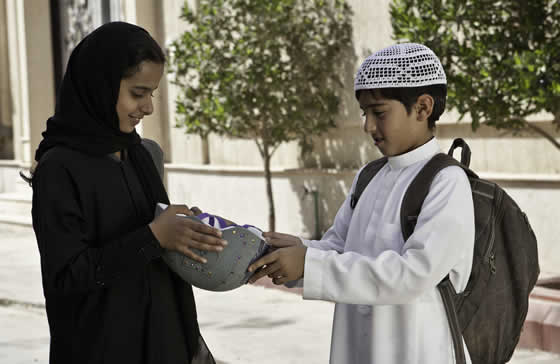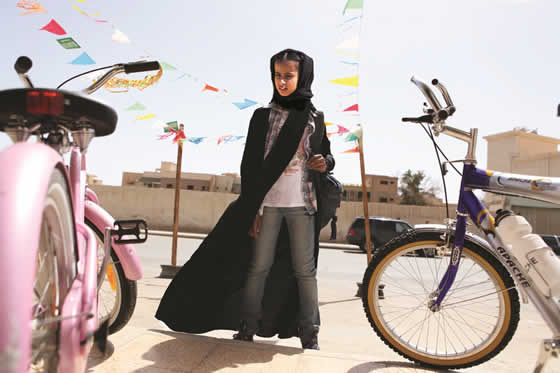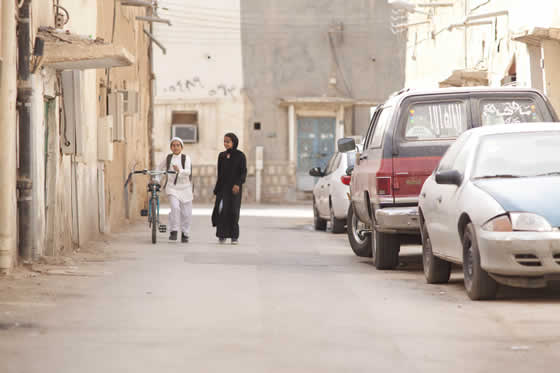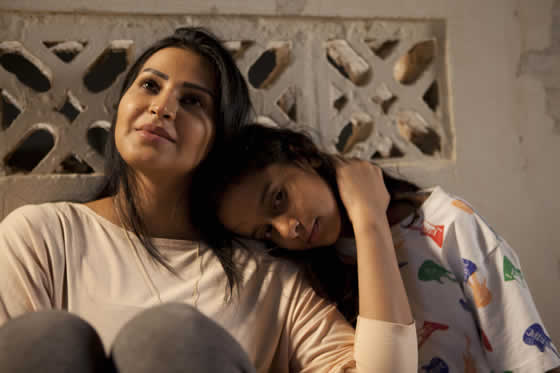 WADJDA is a movie of firsts. This first feature film shot entirely in Saudi Arabia is the story of a young girl living in a suburb of Riyadh determined to raise enough money to buy a bike in a society that sees bicycles as dangerous to a girl’s virtue. Even more impressive, WADJDA is the first feature film made by a female Saudi filmmaker. In a country where cinemas are banned and women cannot drive or vote, writer- director Haifaa Al Mansour has broken many barriers with her new film.
WADJDA is a movie of firsts. This first feature film shot entirely in Saudi Arabia is the story of a young girl living in a suburb of Riyadh determined to raise enough money to buy a bike in a society that sees bicycles as dangerous to a girl’s virtue. Even more impressive, WADJDA is the first feature film made by a female Saudi filmmaker. In a country where cinemas are banned and women cannot drive or vote, writer- director Haifaa Al Mansour has broken many barriers with her new film.
WADJDA had its world premiere at the Venice Film Festival, was shown at the London Film Festival, Telluride Film Festival, and 10 year old star Waad Mohammed won best actress at the Dubai International Film Festival for her break out role as Wadjda.
BijanTehrani: How did you first encounter the subject of your film? What encouraged you to make it and how challenging was it to create Wadjda?
Haifaa Al Mansour: I come from a very small town in Saudi Arabia. I went to public schools and I felt that the school world would be a great place to tell a story.  Therefore, I decided to tell the story of a young girl who is discovering the world and asserting herself. For me I wanted to tell a coming-of-age story in a place where women have a difficult and hectic life. But at the same time, I did not want to make a gloomy or sad film; I wanted to make a film that is empowering. I wanted younger girls, or women in general, to embrace their potential and believe in themselves and move ahead because it is hard for them to survive in a society like this. For me, it is important to give my female audience inspirational characters and characters that are not always victims, but victorious people. The challenges I had were mainly financial. People in the Middle East did not believe in the success of a simple film about a girl and bicycle set in Saudi Arabia. For them, if you want to talk about women’s rights, you have to talk about women being stoned or raped. Showing everyday life is not a typical film from the Middle East, so financing was difficult. I had a German producer who brought a lot of money from Germany, and a Saudi company co-produced the film, so it took a while—5 years—to get it off the ground. Shooting in Saudi Arabia was also very difficult because the country is segregated; men and women are not supposed to mix in public. So whenever we went outside to shoot in the streets, I had orders to be in the van. I had a monitor and a walkie-talkie and I would talk to the actors from the van. That was always difficult and added pressure because I could not be in streets with the men, which was tough but it was also exciting because we were helping bring change through art.
Therefore, I decided to tell the story of a young girl who is discovering the world and asserting herself. For me I wanted to tell a coming-of-age story in a place where women have a difficult and hectic life. But at the same time, I did not want to make a gloomy or sad film; I wanted to make a film that is empowering. I wanted younger girls, or women in general, to embrace their potential and believe in themselves and move ahead because it is hard for them to survive in a society like this. For me, it is important to give my female audience inspirational characters and characters that are not always victims, but victorious people. The challenges I had were mainly financial. People in the Middle East did not believe in the success of a simple film about a girl and bicycle set in Saudi Arabia. For them, if you want to talk about women’s rights, you have to talk about women being stoned or raped. Showing everyday life is not a typical film from the Middle East, so financing was difficult. I had a German producer who brought a lot of money from Germany, and a Saudi company co-produced the film, so it took a while—5 years—to get it off the ground. Shooting in Saudi Arabia was also very difficult because the country is segregated; men and women are not supposed to mix in public. So whenever we went outside to shoot in the streets, I had orders to be in the van. I had a monitor and a walkie-talkie and I would talk to the actors from the van. That was always difficult and added pressure because I could not be in streets with the men, which was tough but it was also exciting because we were helping bring change through art.
BT: I know that your father was an inspiration to you; he was a poet, correct? Can you tell us a little bit about him and his work?
HM: My father was amazing. He passed away a couple of years ago but he gave me all of the chances that I wanted to have in life. In Saudi culture it is very tribal, so it is not only the father and the mother that make decisions in a kid’s life, but even the extended families: the uncles and aunts and grandparents and all of that. But my father never listened to them when I started making films. They would say things like, ”You are an honorable and decent man, how could you let your daughter appear on TV and make films of that kind?”, but he never cared. All he cared was that I was happy and doing things that made me happy. As I told you, I grew up in a small town in Saudi Arabia and my parents, although they were very open and approachable, were also very traditional. They had twelve kids and I am number eight, so you can imagine a house with twelve kids running around! My father used to bring home a lot of films from Blockbuster, so I saw so many films as a kid. Being in a small town, there is very little to do so films showed me the world.
 BT: Where do you live now?
BT: Where do you live now?
HM: I live now in Bahrain, it’s a small Island next to Saudi Arabia. My husband works there, so I live there with my husband and two children.
BT: Did the Saudi Arabian government have any problems with your film, and has it had a chance to be shown in Saudi Arabia?
HM: I hope that there will be chances for the film to be shown in Saudi Arabia. They approved the script, and I tried to write a script that still maintained my voice as a filmmaker. it is not offensive and it does not clash with the culture. I tried to just give a real slice of life and let people make whatever they want to make out of it. I think that they accepted that and they realize that I am not trying to be radical I am not trying to be offensive. I tried to give an intimate story about a little girl who wants to pursue a dream; I wanted a sympathetic tone so people can feel the emotion in the film. So I hope it will be shown in Saudi Arabia and I don’t think there should be a problem with it being shown; we’ll see where it goes from there.
BT: How did you go about casting the girl in your film?
HM: Yeah, it was amazing finding her! In Saudi Arabia, we don’t have casting agencies and we always have to depend on word of mouth, so finding her was not easy. We had to rely on the small production companies that recruited a lot of kids, and one of them is a girl who came very late in the auditioning process. Producers are all about planning and everything has to be on time, but in Saudi Arabia, nothing is on time and time is irrelevant. She came in one week before principal shooting, wearing jeans and an 80’s style jacket. She was listening to Justin Bieber and she did not speak English, but she understood Justin Bieber and his songs, so she was a great example of modern youth culture.
BT: What is your next project you have planned?
HM: Of course I want to make more films. I am so happy that people are reacting well to this film, so hopefully we will find money for the next one and, of course, I want to tell more stories from Saudi Arabia. It is a great place and there are so many stories to be told there. I want to work with the same production companies, I want to work with Laser Films, and I want to work with Ritana. Of course, if there are any opportunities coming from other parts of the world, I would like to explore bigger projects, but Saudi Arabia is where my heart is.
BT: Are you influenced by any female film directors?
HM: I am not sure, because they are rare, but I am definitely influenced by films that have female protagonists, for example Rosetta; this girl who has so much courage to rise above her surroundings and never give up, it is so inspiring as a character. My film is in no way as bleak or as sad as that film, but in the same way it has the same message to be persistent and move ahead to try and change your situation. Of course, Bihrani and all the great Iranian filmmakers are influences of mine as well. In Saudi Arabia, we need to learn from the Iranian school and try to understand it because we have a very similar culture and similar issues.
BT: Neighboring Iran, has so many young film directors, particularly female film directors. Do you think you will see a similar trend in Saudi Arabia?
HM: Yes, I hope so! I think there is a big chance to see a lot of things coming from Saudi Arabia, as people are being true to themselves and telling stories about their world and saying more about their culture than ever before.

